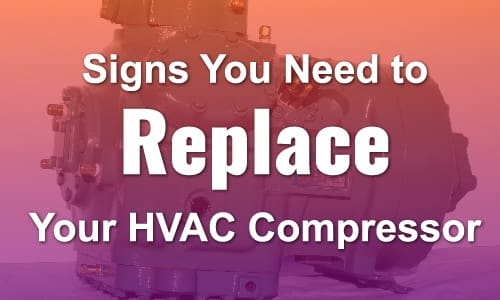The compressor is one of the most expensive components to replace in an HVAC system. However, an HVAC compressor will inevitably reach the end of its service life. When this happens, businesses need to invest in a compressor replacement.
As it is quite difficult to determine when you should replace your HVAC compressor, here are several telltale signs indicating that your compressor might be on its last leg.
Your Compressor Has Become Obsolete
On average, the lifespan of a compressor ranges from 10 to 15 years. Therefore, if your HVAC compressor is 10 or more years old, and presents any signs of failure that are indicative of bigger problems to come (e.g. unusual noises, short cycling, reduced cooling capacity, etc.), then it might be better to replace it.
Replacing an old, malfunctioning compressor with a remanufactured or new unit before a failure occurs can help you prevent unscheduled downtime, costly repairs, and revenue loss.
On the other hand, if you have an effective HVAC maintenance program in place, the professional technicians who perform the maintenance operations will be able to provide unbiased advice on when to replace your compressor. In addition to age, technicians consider some other essential factors, including former repair history, overall reliability, and energy efficiency.
Your HVAC Compressor Fails Frequently
The longer you try to salvage your HVAC compressor, the more likely it will fail under intense operating conditions. Although a compressor may malfunction due to a series of small issues that aren’t difficult or expensive to fix, frequent compressor failures can become distressing problems, with potentially negative effects on business operations. These are the instances where it’s more viable to replace a compressor instead of continuously repairing it.
Energy Bills Keep Rising
In a commercial, industrial, or public building, an HVAC compressor that becomes less efficient will start to consume more energy. Thus, higher energy bills might be an indicator that you need a compressor replacement.
While replacing your HVAC compressor with a remanufactured or brand-new unit may seem expensive, investing in a more energy-efficient model often results in substantial energy savings and lower carbon dioxide emissions.
Since recent advances have greatly improved the energy efficiency of today’s compressors, it’s important to determine if your HVAC system could benefit from the latest technologies. One such technology is the modulation capacity control, which adjusts the capacity of the compressor based on system loads.
The Repair Cost
Sometimes, repairing an old compressor can cost about the same as buying a remanufactured unit. However, most professionals recommend replacing the compressor if the repair cost (including the cost of recharging it) is more than 50% of the price of a remanufactured unit.
Additionally, if a compressor replacement is significantly more energy efficient than your old HVAC compressor, it might make more financial sense to replace it, regardless of the repair cost.
If your existing HVAC system has recently shown any signs of failure, the best way to assess its condition is to schedule an inspection with a professional technician. Also, make sure that the technician carefully checks and tests the entire system. You would hate to swap some parts, like fan motors, filters, and/or ductwork, only to find that their cleaning or replacement is needed within several weeks.
With over 32 years of experience in delivering compressor solutions to many customers and over 100 years of combined experience, Compressors Unlimited has become a well-known supplier of leading compressor brands. Currently, we offer a wide range of products, including remanufactured compressors, brand-new compressors, spare parts, and accessories, which are perfectly suited for different commercial and industrial operations with a warranty.












